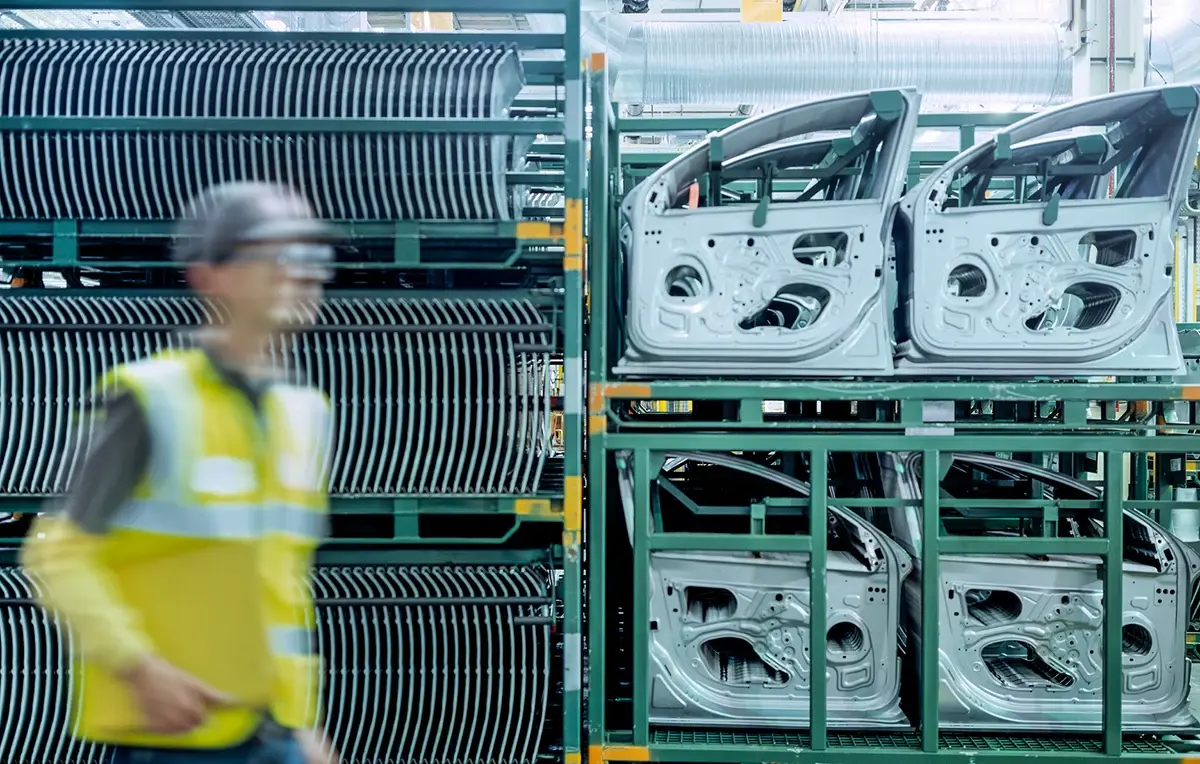horstOS is an end-to-end software platform that makes Physical AI usable for industrial automation – seamlessly connecting planning, implementation, and operation without media breaks.
4 min read
 Benjamin Brumm
:
May 26, 2025 9:56:46 AM
Benjamin Brumm
:
May 26, 2025 9:56:46 AM

The automation of manufacturing processes - whether in series production or small series production - is one of the key challenges for automotive suppliers. Companies that specialize in metal processing in particular must find the right balance between efficiency, quality requirements and cost reduction in order to survive in international competition.
In this article, we shed light on the specific requirements of metal processing, explain different automation concepts and show how modular systems, intelligent software solutions and integrated robot platforms pave the way for future-proof production.
Series production is characterized by the manufacture of large quantities of identical components. Standardized workflows and optimized manufacturing processes achieve economies of scale that lead to low costs per unit. Nevertheless, rigid process structures can limit flexibility and dampen the ability to react to market changes.
Typical areas of application in metalworking, such as automated machine loading, welding processes, CNC machining or inline quality control, benefit from high-precision and reliable automation systems. Seamless integration of robots into existing production lines ensures a continuous material flow - a decisive factor in series production, where process reliability and repeat accuracy are essential.
In contrast to series production, small series production requires a high degree of adaptability in order to meet changing customer requirements and varying order sizes. This is where flexible automation solutions open up new possibilities: Robots with graphical programming interfaces and integrated control systems significantly reduce changeover times and make it easier to produce with consistent precision, even with frequent part changes .
Automated loading systems and optimized processes for parts separation ensure that even smaller production batches can be realized economically. By using intelligent sensor technology and AI-supported software, production processes can be adapted to new component geometries in real time - it is often sufficient to switch between predefined program modules.

A key advantage of automation is the significant increase in production speed and precision. Robots and automated systems work constantly and reliably, regardless of shift or break times. Thanks to 24/7 operation, automated production outperforms manual production - especially for large quantities: It is true that humans can complete certain tasks, for example in the pick-and-place area, faster than a robot. Converted to the entire day, automation nevertheless leads to a higher overall output.
In addition, intelligent loading systems and robot-supported material flow solutions enable almost seamless production, which can also respond quickly to fluctuations in demand.
The integration of automated quality control reduces human error and minimizes inconsistent processes. This precision is particularly essential in metalworking, where even the smallest deviations can lead to significant quality problems. AI-supported inspection systems detect material defects at an early stage, thereby reducing the reject rate in the long term. This is complemented by robot systems that ensure exact positioning and repeat accuracy so that every component meets the high industry standards and customer expectations.
Although series production often relies on permanently installed automation solutions, modern systems also offer unexpected advantages in this area : quickly reprogrammable robots and adaptive control systems make it possible to react to different product variants - without long changeover times. For automotive suppliers who work with a high number of variants, this means a significant improvement in production planning and process stability. Modern, AI-supported gripper systems and component recognition devices further increase flexibility.
Initial investments in automation technologies pay off in the long term, often within six months of operation. Automated quality controls, more precise process sequences and optimized warehousing can significantly reduce material and personnel costs. By reducing manual activities, employees can be freed up for higher-value tasks and the personnel budget can be reallocated accordingly. Just-in-time production also reduces storage costs.
Tip: Once automation has been implemented, predictive maintenance strategies ensure that unexpected breakdowns are avoided and downtimes are kept as short as possible.
A common misconception is that automation would replace jobs. On the contrary - modern automation systems relieve employees of repetitive and physically demanding tasks so that they can concentrate on monitoring, optimizing and strategic activities. The intuitive operability of modern robot solutions reduces the amount of training required and enables rapid familiarization, which is a clear competitive advantage, especially in metal processing.
Automation optimizes processes in small series production by alleviating bottlenecks, for example due to illness or a general lack of personnel. Flexible systems and a holistic approach to automation ensure that even changing production orders can be realized without lengthy set-up times. By combining robust, industrial-grade robot hardware with user-friendly, AI-supported software, a consistently high machine uptime can be achieved, which significantly improves efficiency in an environment with frequent product changes.
The reduction in manual work steps leads to a significant decrease in labor costs. Accurate and precise processes also minimize waste and reduce material consumption - a decisive advantage in the face of scarce and increasingly expensive raw materials. Thanks to flexible automation solutions, which can also handle several sub-tasks on a production line if required, specialized machines are also needed less frequently.
In small series production, the ability to adapt to different component geometries is of central importance. Modular robot platforms and AI support for the automation software enable production processes to be changed over quickly - without having to resort to long downtimes. This not only boosts productivity, but also increases the speed at which new products can be brought to market. This significantly shortens development cycles, which sustainably supports the innovation process.
The implementation of optical camera systems and AI-supported error analysis leads to seamless quality control. Compared to manual inspection, which is prone to fatigue and subjective judgment, automated systems ensure consistent inspection quality. Thanks to real-time corrections, potential deviations are detected and corrected immediately - a crucial factor in the automotive supply industry, where error tolerances are often close to zero.
Automation not only speeds up the production process, but also allows more time for innovation. By combining additive manufacturing technologies, such as 3D printing, with automated machining centers, new materials and designs can be tested quickly and cost-effectively. Simulation-based approaches with digital twins make it possible to optimize processes in advance and accelerate project launches - a decisive competitive advantage in a dynamic market environment.
For automotive suppliers, especially those in metal processing, targeted automation is no longer an optional luxury, but a decisive factor for sustainable success. The benefits range from a significant increase in efficiency and quality with enormous flexibility to long-term cost savings. Companies that rely on modular, scalable and intuitively operable automation systems not only ensure higher productivity, but also future-proof production - even in a market environment in which variant diversity and rapid adaptability are required.
The approaches presented in this article show how automation can become a success factor for companies - be it through standardized processes in series production or through flexibility in small series production. Modern automation solutions make it possible not only to react to short-term challenges, but also to invest strategically in the future. This leads to sustainably economical production that both meets the requirements of today's markets and anticipates future developments.
Would you like to learn more about how automation improves profitability in metal processing? Download our white paper and calculate the ROI for various use cases - see for yourself the potential that automation can open up for your company.